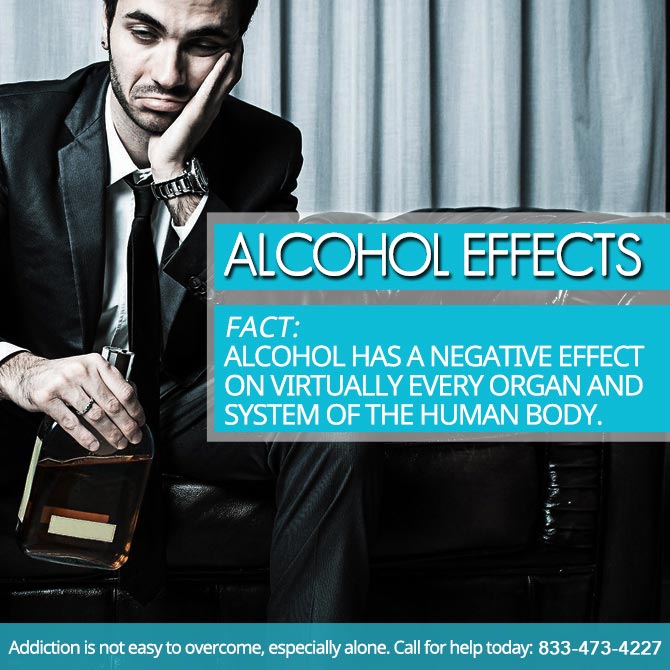
Although the general public might believe alcohol effects are primarily on the brain and liver, alcohol has an effect on virtually every organ and system of the human body. Further, depending upon the amount of alcohol consumed and the length of time someone regularly drinks, the effects of alcohol can be temporary, cumulative or permanent.
The First Sip
Alcohol is ingested orally and travels through the esophagus to the stomach. Alcohol requires no digestion before it enters the bloodstream. If the stomach is empty, twenty percent of the alcohol is absorbed through the stomach walls into the bloodstream and begins to affect the brain within a minute. For this reason, many alcoholics prefer to drink on an empty stomach. Although the esophagus is only the tube through which an alcoholic drink passes on its way to the stomach, half of oral, esophageal cancers and laryngeal cancers are related to regular drinking. The remaining alcohol makes its way to the small intestine where it is also readily absorbed.
For regular drinkers, the absorption of alcohol through the lining of the stomach can produce irritation of the tissues known as gastritis. Chronic drinkers can also develop gastrointestinal reflux, ulcers and even a total erosion of the stomach wall into the body cavity. Alcohol’s effect on the small intestine can be subtler. This portion of the GI tract is especially designed to absorb necessary vitamins and nutrients. Chronic inflammation from alcohol irritation can impair this function and eventually lead to malnutrition.
Are you or a loved one suffering from addiction?
Don't wait, get the best treatment options today
Call Now: (833) 473-4227Having Another Drink or Three
Continued drinking increases the body’s blood alcohol level once the rate of consumption exceeds the ability of the body to metabolize, about one standard drink per hour. Although alcohol doesn’t require digestion, it does require metabolism, or a molecular breakdown, in order to be excreted. The liver is the primary organ involved in alcohol metabolism and with chronic drinking, this chemical process can result in hepatitis or inflammation of the liver. A fatty liver develops as the organ is forced to metabolize alcohol for fuel instead of its preferred fatty acids. Finally, irreversible damage occurs in the form of cirrhosis, permanent scarring and markedly decreased function.
Chronic heavy drinking and high blood alcohol levels can also harm blood cells. Alcoholics are more prone to infections because of white blood cell abnormalities. Alcohol also interferes with the blood cells responsible for blood clotting, resulting in frequent bruising and increased clotting times.
What Alcoholics Think and Feel
As indicated earlier, alcohol ingested on an empty stomach can affect brain cells in a minute or less. Initial effects on the brain can make the drinker feel euphoria with a loss of fine motor control. Judgment is impaired. Additional drinks may be ordered despite earlier promises to limit alcohol intake. This period of time, from 0.03 to 0.12 BAC, varies according to the drinker’s age, sex and usual levels of consumption. From BAC’s of 0.09 to 0.25, coordination, recent memory and even vision may become blurry during what is known as the excitement period. Additional levels of intoxication include confusion, from 0.18 to 0.30; stupor, from 0.25 to 0.40; coma, from 0.35 to 0.50; and death at levels above 0.50.
Treating the Effects of Long-Term Alcohol Intake
The effects of alcohol on the body can be treated, although significant liver and brain damage can be permanent. The first step is abstinence, achieved through a medically supervised alcohol detoxification program to avoid life-threatening complications such as seizures. Vitamin supplements, such as thiamine and the water-soluble B-vitamins, and increased nutrition can help the body begin to repair the effects of long-term heaving drinking from within. Proper scheduling of meals and correct carbohydrate consumption can help blood sugar fluctuations that are common in alcohols who are no longer ingesting instant energy in the form of their drink of choice. A patient’s continued separation from alcohol helps to improve their cognitive skills and “clear their heads,” assuming that their sobriety has occurred before permanent brain damage takes place. However, even as the patients emerge from the fog of their addiction and usual weaning with benzodiazepines, significant brain dysfunction can be evident in poor impulse control and poor judgement. For this reason, outpatient therapy is a necessity and after that, participation in an AA community is often recommended.
Contact Drugrehab.org Today
Addiction can take hold of your life before you know it. If you or a loved one are trapped in an addiction to drugs or alcohol that you can’t break out of please contact Drugrehab.org today. We are highly trained professionals with the resources to help you no matter the severity of your current condition.
Call us today at the toll free number at the top of the page. If you feel more at ease emailing us, please simply fill out our form in the right column. You can beat this and we can help you.

